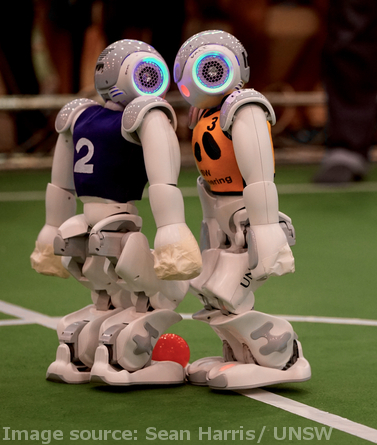Local team takes high-tech title again
 Australia has again taken out the most prestigious prize in the world of robot soccer.
Australia has again taken out the most prestigious prize in the world of robot soccer.
The University of New South Wales’ team has won the Robocup SPL World Championships for the second time in a row, fending off a squad of German ‘bots to take the title in a nail-biting final.
The Robocup competition pits fully autonomous robots (with no remote control or human interaction at all) against each other in 5-on-5 robot soccer.
Teams from universities around the world are each given the exact same set of robots, so the only difference is the software and artificial intelligence (AI) with which they are imbued.
Competitors say that this year’s final was one of the most exhilarating ever, locked at 1-1 until just moments before the end.
The Germans appeared to have programmed their robots with defence in mind, while the Australian team developed a secret weapon – a ‘fast walking’ ability that let them streak ahead of their slower counterparts.
The final could have gone either way until the final minutes, when the UNSW team took a timeout to repair three injured members of its team before retaking the field and putting away two quick goals.
The rules of the competition change each year, and this year saw the addition of a referee’s whistle to start all the finals matches.
Previously, they kicked-off after simultaneously receiving a WiFi message, but this year they had to be programmed to listen out for an actual whistle.
Not only were they crowned champions, but rUNSWift (the UNSW team) was the only team to start all its robots on the referee’s whistle.
Sean Harris, a PhD student in robotics and artificial intelligence and member of the rUNSWift team, said this was because of some pre-programmed teamwork.
“The team decided whether or not they had heard the whistle together,” Harris writes in a post-game breakdown for The Conversation.
‘If only one robot heard a whistle, but the other four didn’t, they decide that the one robot must have been wrong, and don’t play. If three out of the five hear a whistle, but the last two don’t, then they decide the two must have missed it and they all start playing.”
“This majority vote system was crucial in ensuring our team listened to the whistle reliably.”
He said that with UNSW now two-time champions, other countries will come gunning for their record.
“Winning two world championships in a row has put a huge target on our back now,” Harris says.
“All the other teams will be closely watching our progress and focusing their strategies to beat us next year.
“We will spend the next 12 months continuing to innovate and ensure that we bring an even better team to the competition next year.
“Robocup also announced that it is coming to Sydney in 2019. Although it’s a long way off yet, we are looking forward to having a home ground advantage in a few years time.”
Check out the exciting final below;








 Print
Print